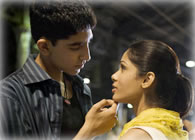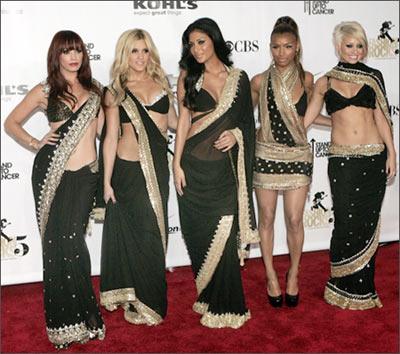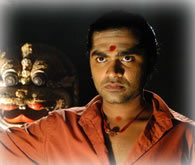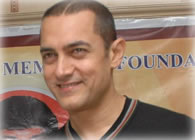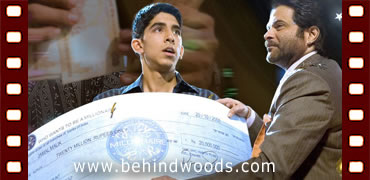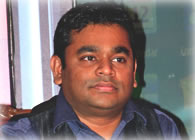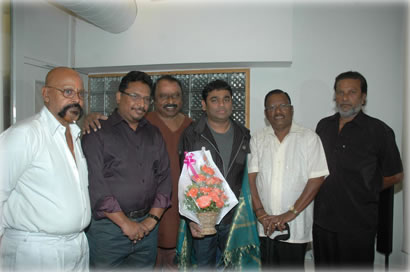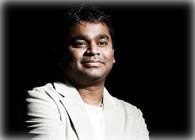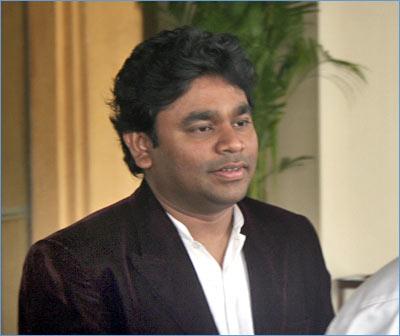Out of nowhere, British filmmaker
Danny Boyle has burst back into the spotlight this year with his latest film,
Slumdog Millionaire. Not only did I
absolutely love it when I saw it at its world premiere, but its gone on to earn incredible praise from critics worldwide. I had the honor of meeting Boyle at an afterparty in Telluride and interviewing him the following morning. Boyle is one of the most down-to-earth and incredibly outgoing directors I've
ever met, and that's not an exaggeration. Not only is he excited to talk about every last detail about filmmaking, but he's so nice that it was like chatting with a close friend about movies at an early morning breakfast. I'm pretty damn sure this is an interview you don't want to miss.
Boyle has been one of my favorite filmmakers for years, whether I knew it or not. Trainspotting is a cult classic, we all know that, but Boyle went on to direct 28 Days Later, which rebooted the zombie genre, and Sunshine, which is one of my all-time favorite sci-fi flicks. He's back again with arguably his best film to date and he's excited to be showing it to the world. Even if you haven't seen it yet, this is an interview that should hopefully inform you on the behind-the-scenes of Slumdog Millionaire and so much more.
So what drew you to India this time? Was it Simon Beaufoy's script more than anything?
Danny Boyle: I think it's– somebody said, quite soon after we got started on it, that it's very Dickensian, and that's what's really attractive about it is that what you get in Dickens, who's a master storyteller of course, is you get these extremes, in Victorian Britain, with London especially. You get incredible wealth, an explosion of opportunity, things changing, the industry or society just going off like a nuclear bomb in terms of expansion, and you get terrible– like I live in the East End of London, and the poverty in the East End of London at the time was just phenomenal– you get these massive extremes of opportunity and desperation, and it affects everything. It makes it a melodramatic age, and of course Dickens' work is incredibly melodramatic, and yet, because it's fixed in the society, it doesn't feel melodramatic, it still feels real. And of course you get that in India because it's going through much of the same thing at the moment.
So you find a kind of vibrancy, that we lack a bit in the West, because we've insulated our realistic lives against it, and so our melodramatic, more extreme storytelling tends to be fixated in franchise movies at the moment, in superhero movies, completely unreal, but you can get those extremes in it. But you can't get them in real life anymore and real life stories tend to be, in the West, tend to be minutia, don't they? They tend to be about affairs, people breaking up, having a disabled child, kind of just the minutia of life. The big massive storytelling, huge sign posts are missing, in a way, because we've basically comforted ourselves out of them; we've made life a lot more comfortable for everyone. And that's one of the things that just draws you to it. And you realize that in retrospect. You read a script and you just go, "I've gotta make this." I think that's what's behind it, the attraction of it. And the finished film feels like that as well. People feel like they're watching something very vibrant.
Were you familiar with Vikas Swarup's book before? Boyle: No, and I didn't read the book, and I committed to the film before I read the book. And I didn't find the book– I thought the script was an amazing achievement and– although lots of people have rung me up and said, "Hey, I've just read the book of your film, it's fantastic." Well it's very different, the film. So and it is very different I think Simon [Beaufoy] did a wonderful job on the script.
I think that was of the best parts of it is instead of just a straight story you've got an interesting way to tell the life story of this kid.
Boyle: Because I think a more straight telling of it could become too literal. Here's a question, here's an answer, here's another question, here's another answer; you tire of that quite quickly. And it's lovely the way he's shifted that around, in the structure. And we developed that– as we made the film, and especially as we edited it– we developed that further, the risks we took with time, going backward and forward in time. It becomes quite fluid, what you can cut to, and it culminates really– well when she answers the phone, on the show, and he says, "Who is this?", and you cut to her as a child, in the rain, saying, "I'm Latika." And you can certainly go anywhere, you can sort of drop anything in from– it becomes kind of fluid. I love that feeling. I've never really been able to do any of that before in anything, and I love doing that, in the editing.
I really loved that transition when they jumped off of the train and changed ages…
Boyle: Yes, because you've got to be fluid about it, because you've got to say, "These are the same people, so we're going to go anywhere in their world." And here you go. I remember the very first time I read the script, I thought of that transition, because it isn't in the script. It's just one of those things– and one of the reasons why you should make films is when you react to it like that, when you see things as you're reading it, you shouldn't bother about whether it's a good idea to make the film or not, or whether you can attract a star or not, or what kind of money– you should just do it. Because if you feel like that about it, it's destiny.
Is it troublesome to shoot in a country like that, from the technical aspects to culture to government and everything?
Boyle: That's about the three things– yeah, but you can't think of it as troublesome. That's what I learned really quickly. If you do, you won't be open to it, you'll always be critical of it, because there's a lot of things get on your nerves, the government especially. Like we applied for aerial permission to shoot some aerial shots and we applied in–when we first got there–in June/July 2007, to shoot. We applied for permission with an Indian– you're not allowed, Westerners aren't allowed to shoot from helicopters but Indian [Directors of Photography] can. So we got an Indian DoP, we put his name on the permission. We said exactly where we want to shoot; we said not near any naval ports, anything like that. Permission to shoot there came through last week. Seriously.
So there are some aerial shoots in it which we took by secret. We went up with this Canon camera, this still camera, and blended them together in post. And so we got some shots anyway. And that's an example. You can wait five years for permission, and you're meant to just wait. But you can't think of it like that, you've got to go, okay, what can we do instead? We'll do this. And you got to stay positive and hope the film feels positive, even though there's some horrors in it; because that's what I feel about the prize and that's how it struck me. I'm incredibly optimistic about it, even though it's horrific, some of the things that are happening there. You do feel amazingly optimistic and they are a very positive people. So I loved it.
Were you inspired at all by any other films from Bollywood? Or I was going to even say City of God, I felt had a lot of inspiration in this. Did that play into anything in this?
Boyle: I didn't. Obviously you can see some similarities to City, but I stayed away from it because, although I admired it enormously when I saw it, I didn't go back to it, because you've got to be very careful. With anything that's at all similar, you've got to be very careful. No, it's funny actually, normally when I do interviews when I'm making a film, I've got a list of films and I'd say, "This, this, this and this." But no, like there were some Bollywood films that I– well they're not real Bollywood films, they're much more like Western films– that I was very taken by, but they're not directly relevant to the film, no.
No, there's not a particular reference point. In a funny kind of way Titanic is a reference point. The reason is that it represents the particular type of film, which is an old person lies in bed, and he's dying, and tells their story, unburdens their story, and secrets are revealed or whatever. It's the end of life and it's the past that's being– what I love about this is the kid is 18 and all his life is in front of him, and yet he's been through such an extraordinary life that he's able to win the show by going back over his life, in just that 18 years. And when the film finishes it shows you that your memories can set you free actually, they don't imprison you– they actually set him free, and he's able to step out and live the rest of his life how he wants to live it. It's sort of like it turns it on its head, that storytelling idea of the old person in bed recapping their life. It's a positive thing rather than it being something that's sentimental, in a way.
Now that you mention it, that's exactly what I was thinking the whole movie — that he was at the end of his life, and then it wasn't till the end that you realized that there he is at the beginning.
Boyle: He's at the beginning, of his adult life, and he's got his childhood sweetheart.
How do you go about choosing the music? I think in all of your films I've loved your musical choices and I think it really defines a lot of your films.
Boyle: Oh, I just love music. It's the bit I probably enjoy more than anything. When you get a chance to work with a guy like this guy– he's an amazing composer,
A. R. Rahman. It was obvious on this that you wanted– the music in Bollywood films is so expressive, it's so much more extreme and upfront than– we tend to hide music, to make it psychological, hidden, Western really, where there they declare it. It's like yeah this is romantic, oh this is dangerous. And anyway so I approached this guy Rahman, and he's an amazing songwriter, very hugely popular there, a huge, massive star, unbelievable star there. And obviously he loved it because it was something different for him to work with a Western director, and we had a great time working on it. And they're all original songs that he's written, apart from– there's an M.I.A. song in the middle of it, "Paper Planes." And she also is a big fan if his because she grew up with all his music because she's– her family is part Sri Lankan, part London. So she was like speechless at the chance to sing for him. So she sings on the first song for him, and then we used her song in the middle. So it's really nice.
I'm very proud of the soundtrack, because it's very unusual. It feels very fresh. That was one of the things I noticed here, watching it in front of a Western audience– because I haven't really seen it in front of an audience– the music felt really fresh. And I loved that, I thought it was really nice. It's been lovely.
I think your choices are always fantastic and I think a lot of directors don't put enough time into choosing the music for their films. It really makes it more than just a movie sometimes.
Boyle: Listen, when I started, like with Shallow Grave and Trainspotting, I used house music in both of them, because house music was just really big in London. I'm a music person, I've grown up with MTV and– not grown up with it, I'm a bit older than that, but it's been part of my life– and it has to be part of the film because everything is accompanied by music on film now. They're almost more connected than dialogue, film and music are like that, and then sometimes there's dialogue as well. And you think about commercials and the way the product is sold and the way that anything's sold. Intel Pentium processors are sold by "da-da, ba-boom." It's all the music…
And it's like large is in. And it's amazing to just sort of see– you can hear it when it's wrong there. Like if you make a mistake with music, especially when you do something like the game show, "Who Wants to Be a Millionaire?", it's not– you think that doesn't sound right. And you can spot it like that, which is a skill you'd never have in something else. We have this amazing processing power. The music, it's so close to us I think. And when you work with somebody from a different culture, like Rahman, you realize how international music is, because you can talk to each other about– through music, you can kind of feed off of each other with different ideas. It's really cool anyway. So yeah I loved doing it, I must say it was great for me.
What was your favorite part of the filmmaking process?
Boyle: I always answer, because I've been asked that before, it's the change; because a lot of people like shooting or don't like editing and vice-versa. I actually like the change, that you go from the chaos of hundreds of people and all the pressure, to a room and there's just three of your, or two of you, and you can get coffee when you want and there doesn't seem to be any deadline at all because you've got ten weeks to edit, and it's a long time, or you think it is at the time. So I love that change. And conversely, as you get to the end of editing, I love the fact of going from that back into filming where there's a lot of people again. So I like the transitions actually more so, I guess.
What are your top five favorite movies of all time?
Boyle: My favorite is
Apocalypse Now (1979), absolute 100% favorite film, because the thing that bedevils us all the time is this battle between commerce and art, and it's between– can you open the Cannes Film Festival or can you get your film seen by a big mainstream audience? And it's maybe the only film that does that, that rides both those horses, without apologizing to anybody on the way. And it's not perfect, which I also love about it, because I think perfect would be terrible; it is a bit of a mess at times, but it's made by a madman with an extraordinarily kind of poetic coherence somehow. And I love that.
They were repackaging Alien, the first Alien film, and they asked me to do a bit about it, because I'm a big fan of it, obviously. And you watch it and you do your piece of camera and you say, "Look, you watch this film and even after 25 years it still stands up. What kind of classic is that?" You watchApocalypse Now and you never think, 25 years, 100 years; you just think oh my fucking god, look at this sequence. So that would be it. I can't answer the top five I'm afraid, but that's my number one. The top five positions are filled by it.
Thansk to Danny Boyle and everyone at Fox Searchlight for this opportunity! It was such a huge pleasure to chat with Danny and I can't suggest enough that everyone check outSlumdog Millionaire. The film will hit theaters starting on November 28th this fall - be sure to check it out!
Courtesy:

